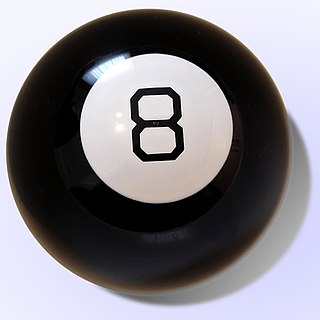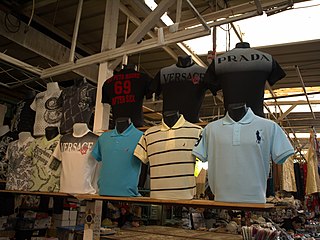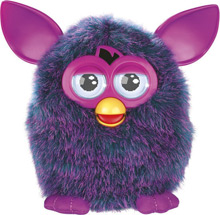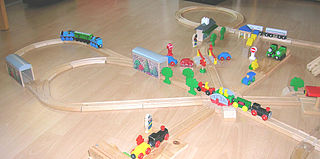
The Magic 8 Ball is a plastic sphere, made to look like an oversized eight ball, that is used for fortune-telling or seeking advice. It was invented in 1946 by Albert C. Carter and Abe Bookman and is currently manufactured by Mattel. The user asks a yes–no question to the ball, then turns it over to reveal an answer that floats up into a window.

To counterfeit means to imitate something authentic, with the intent to steal, destroy, or replace the original, for use in illegal transactions, or otherwise to deceive individuals into believing that the fake is of equal or greater value than the real thing. Counterfeit products are fakes or unauthorized replicas of the real product. Counterfeit products are often produced with the intent to take advantage of the superior value of the imitated product. The word counterfeit frequently describes both the forgeries of currency and documents as well as the imitations of items such as clothing, handbags, shoes, pharmaceuticals, automobile parts, unapproved aircraft parts, watches, electronics and electronic parts, software, works of art, toys, and movies.

Furby is an American electronic robotic toy that was originally released in 1998 by Tiger Electronics. It resembles a hamster or owllike creature and went through a period of being a "must-have" toy following its holiday season launch, with continual sales until 2000. Over 40 million Furbies were sold during the three years of its original production, with 1.8 million sold in 1998, and 14 million in 1999. Its speaking capabilities were translated into 24 languages.
Technozoids, or simply Zoids, is a Japanese science fiction media franchise created by Tomy that feature giant robots called "Zoids". A Zoid is essentially a large mechanical animal, with designs being based on animals; including dinosaurs, insects, arachnids and mythological creatures.

Plasticine is a putty-like modelling material made from calcium salts, petroleum jelly and aliphatic acids. Though originally a brand name for the British version of the product, it is now applied generically in English as a product category to other formulations.

Blythe is a fashion doll, about 28 cm (11 inch) tall, with an oversized head and large eyes that change color with the pull of a string. It was created in 1972 and was initially only sold for one year in the United States by toy company Kenner. In 2001 the Japanese toy company Takara began producing new editions of Blythe dolls. There is a network of hobbyists who customize the doll for resale and create clothing and shoes for Blythe. Enthusiasts share photographs of their work and other types of dolls on the Internet.
Popples is a toy and television franchise created by Those Characters From Cleveland (TCFC), a subsidiary of American Greetings. Popples resemble brightly colored marsupial teddy bears with long tails ending in a pom-pom. Each Popple character transforms to resemble a brightly colored ball. In 2018, Popples was sold to Hasbro.

Longjing tea, sometimes called by its literal translated name Dragon Well tea, is a variety of pan-roasted green tea from the area of Longjing Village in Hangzhou, Zhejiang Province, China. It is produced mostly by hand and renowned for its high quality, earning it the China Famous Tea title.

Tomy Company, Ltd. is a Japanese entertainment company that makes children's toys and merchandise. It was created from a merger on March 1, 2006, of two companies: Tomy and long-time rival Takara. The company has its headquarters in Katsushika, Tokyo.

Tomica is a line of die-cast toy vehicles produced since 1970 by Takara Tomy Co. of Japan. Ostensibly, Tomica diecast were an outgrowth of Tomica World, an autonomous toy line of motorized train accessories that Tomy had created based on Plarail and produced since 1959. Similar in concept, Tomica can be thought of as the Japanese Matchbox - but focuses mainly on Japanese brands.
This is a list of toys created by the popular children's television network Nickelodeon.
Nohohon Zoku (のほほん族) are a range of fist-sized bobble head figurines made by the Japanese toy company Tomy. They first went on sale in Japan on July 18, 2002. They are distinguished by a large spherical head with a wide smile and dots for eyes. The purpose of the dolls is stress relief. This has made them popular as novelty items in offices. Nohohon are marketed as Sunshine Buddies in English speaking countries.

Beyblade is a line of spinning-top toys originally developed by Takara, first released in Japan in July 1999, along with its debut series. Following Takara's merger with Tomy in 2006, Beyblades are now developed by Takara Tomy. Various toy companies around the world have licensed Beyblade toys for their own regions, including Hasbro in Western countries, Sonokong in Korea, and Takara Tomy for Eastern countries.
The Omnibot (オムニボット) is a toy robot originally manufactured by Tomy in the mid-1980s. The name then came to apply to the successful line of robots manufactured by the company. The initial Omnibot was announced with expectations of restoring popular interest in robots, at a time when it was becoming obvious that robots with advanced AI such as R2-D2 were still a long way away. A more advanced version of the Omnibot was called the Omnibot 2000 and did not have a plastic bubble over its head. With the success of the Omnibots, the Omnibot range quickly expanded. After the video game crash of 1983 and its debilitating effect on the nascent home electronics industry, the Omnibot faded away but it was revived in the early 2000s. The latest version of the Omnibot is the i-SOBOT.

Wooden toy trains are toy trains that run on a wooden track system with grooves to guide the wheels of the rolling stock. While the trains, tracks and scenery accessories are made mainly of wood, the engines and cars connect to each other using metal hooks or small magnets, and some use plastic wheels mounted on metal axles. Some trains are made to resemble anthropomorphical, fictional, and prototypical railroad equipment.
The TI-34 name is a branding used by Texas Instruments for its mid-range scientific calculators aimed at the educational market. The first TI-34 model was introduced in 1987 as a midpoint between the TI-30 series and the TI-35/TI-36 series. Earlier models included Boolean algebra features, though these were removed with the introduction of the TI-34II in 1999, which focuses more on fractional calculations and other subjects common in middle and high school math and science curricula.
Dragonite International Limited, formerly known as Ruyan Group (Holdings) Limited, and initially, Golden Dragon Group (Holdings), is a health care and pharmaceutical company. In 2013, Imperial Tobacco purchased Dragonite's electronic cigarette division.
Counterfeit consumer goods are goods, often of inferior quality, made or sold under another's brand name without the brand owner's authorization. Sellers of such goods may infringe on either the trademark, patent or copyright of the brand owner by passing off its goods as made by the brand owner. Counterfeit products made up 5 to 7% of world trade in 2013, and in 2014 cost an estimated 2.5 million jobs worldwide, with up to 750,000 jobs lost in the U.S. About 5% of goods imported into the European Union in 2013 were fakes, according to the OECD.

A foldable smartphone is a smartphone with a folding form factor. It is reminiscent of the clamshell design of many earlier feature phones. Some variants of the concept use multiple touchscreen panels on a hinge, while other designs utilise a flexible display. Concepts of such devices date back as early as Nokia's "Morph" concept in 2008, and a concept presented by Samsung Electronics in 2013, while the first commercially available folding smartphones with OLED displays began to emerge in November 2018.

Squishmallows is a brand of stuffed toy that was launched in 2017 by Kelly Toys Holdings LLC. Squishmallows are round and come in a variety of colors, sizes, animals, and textures. The brand has created over 1,000 Squishmallows characters with unique names and background stories. Depending on the size and store, prices can range between $3-$50 but rarer collections are often priced higher.











